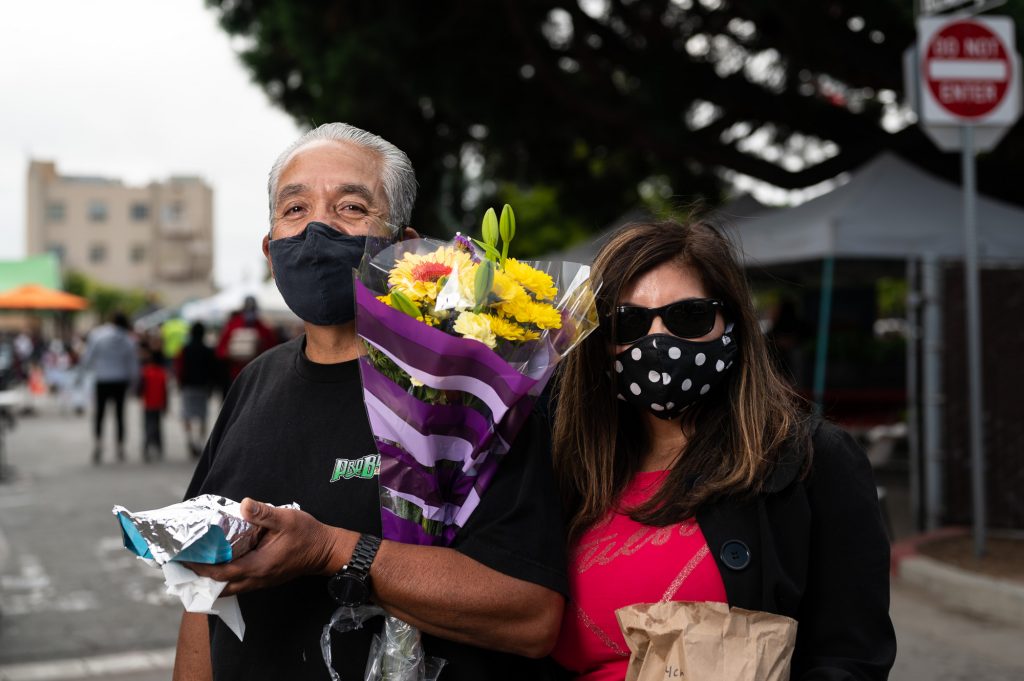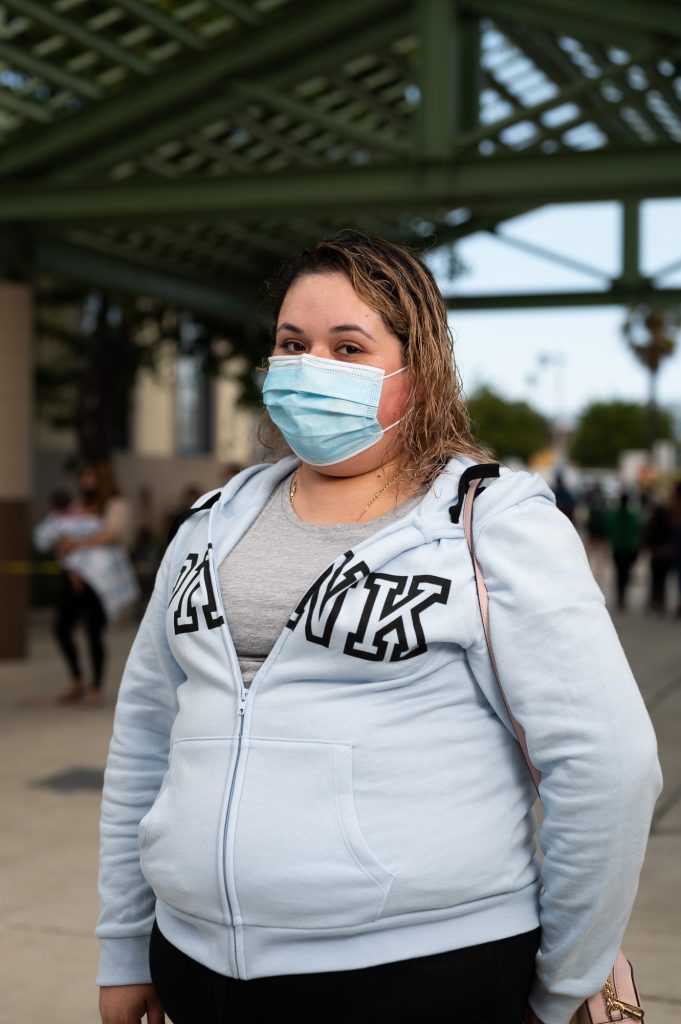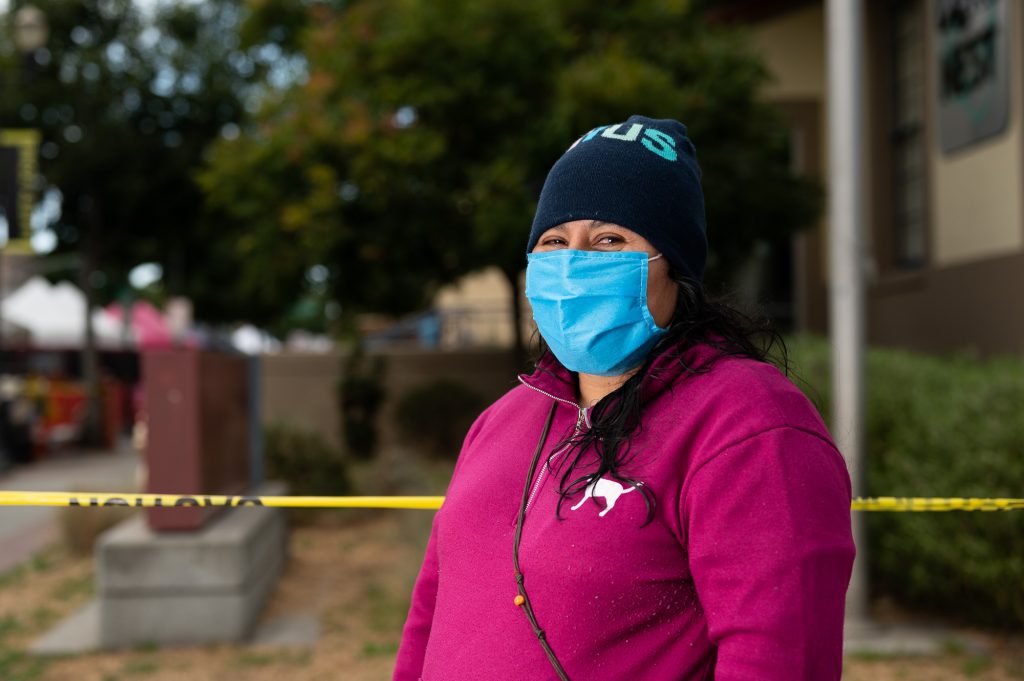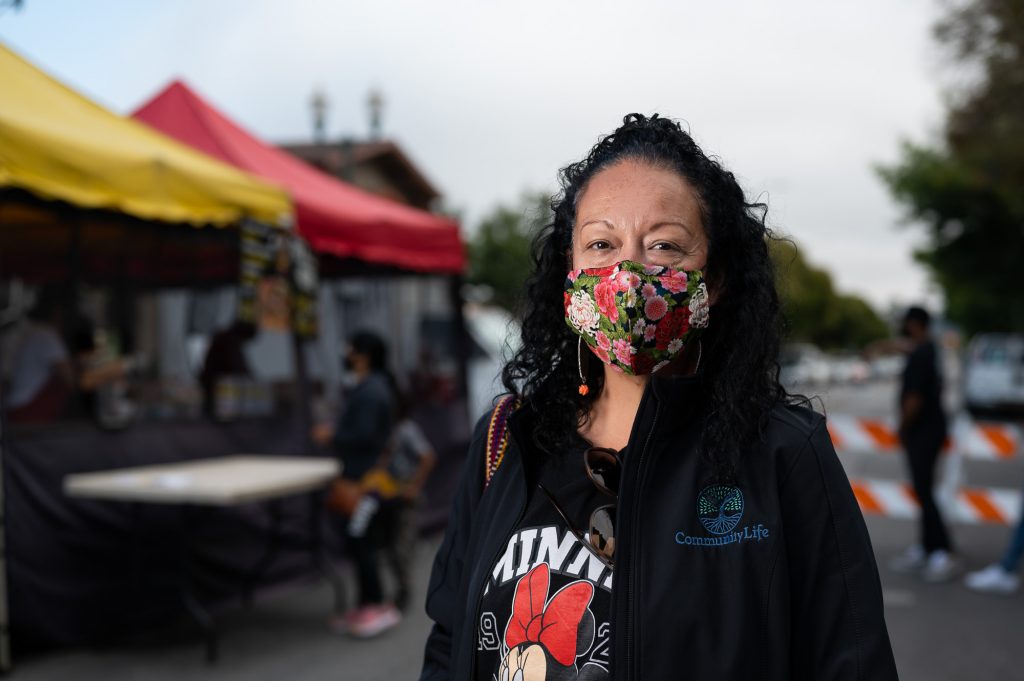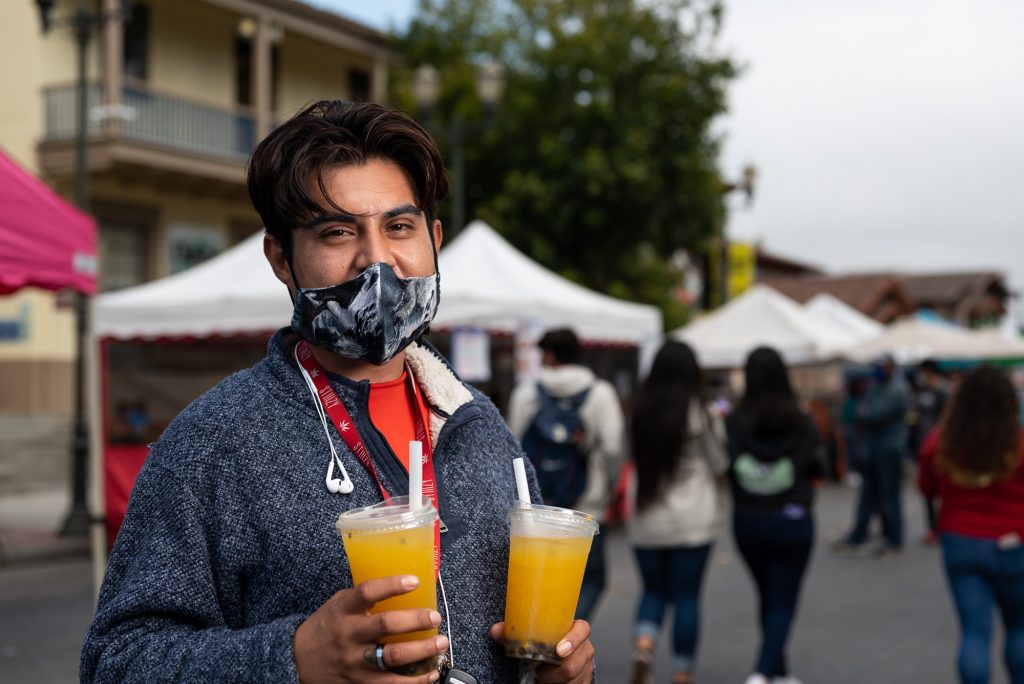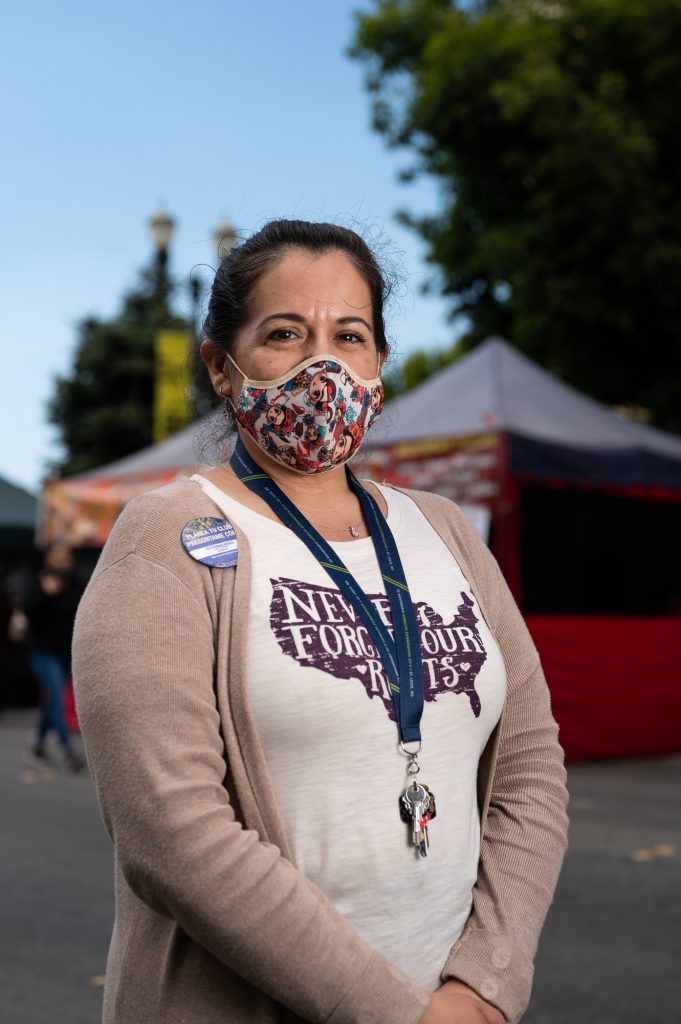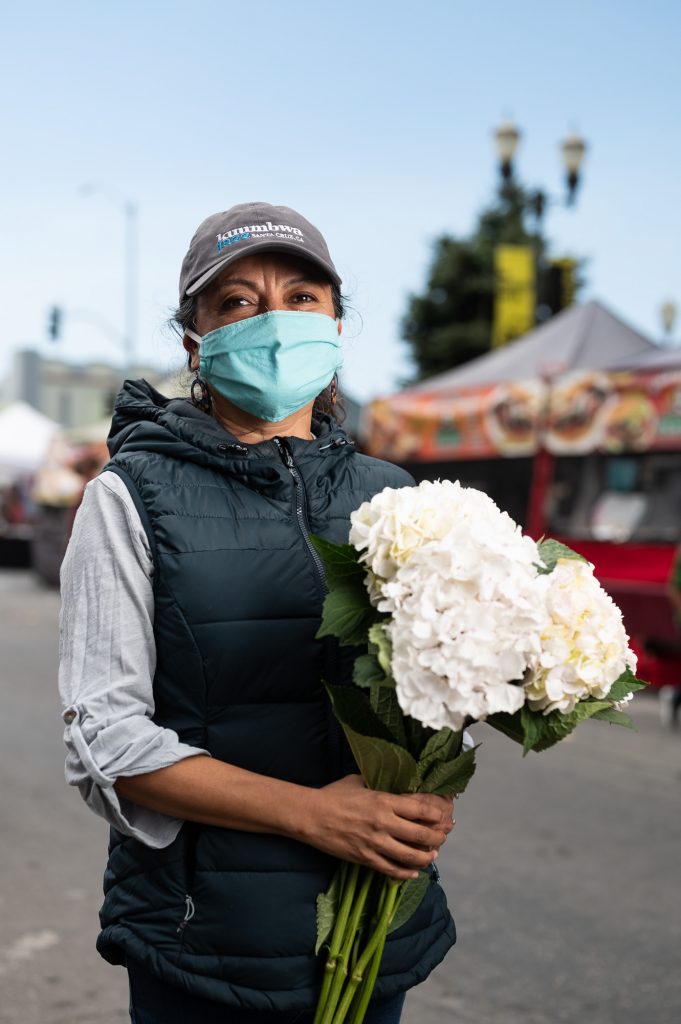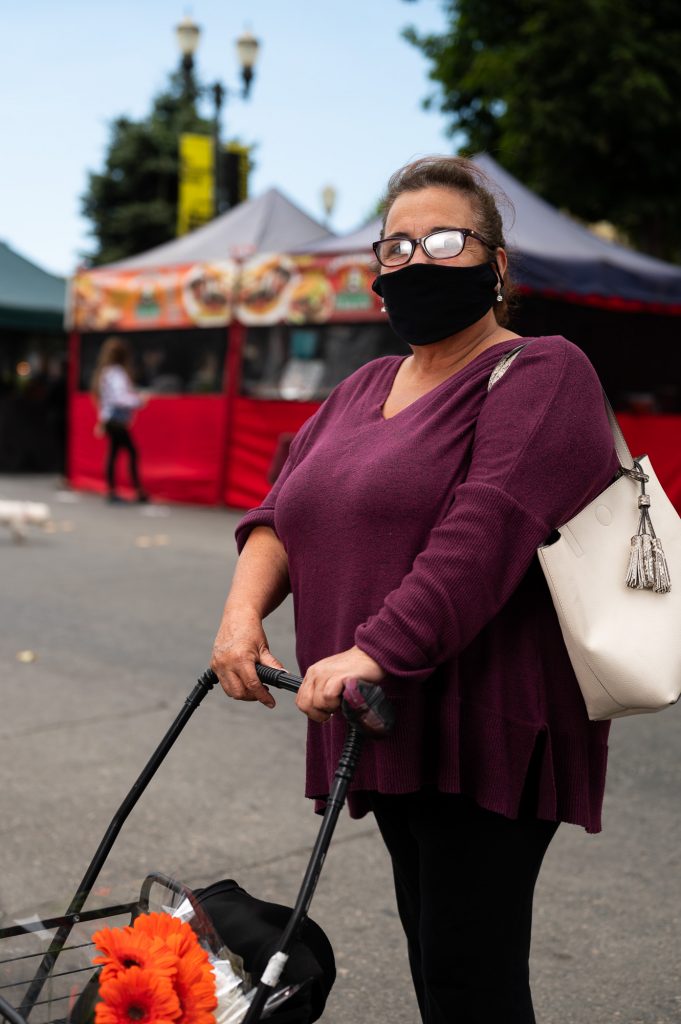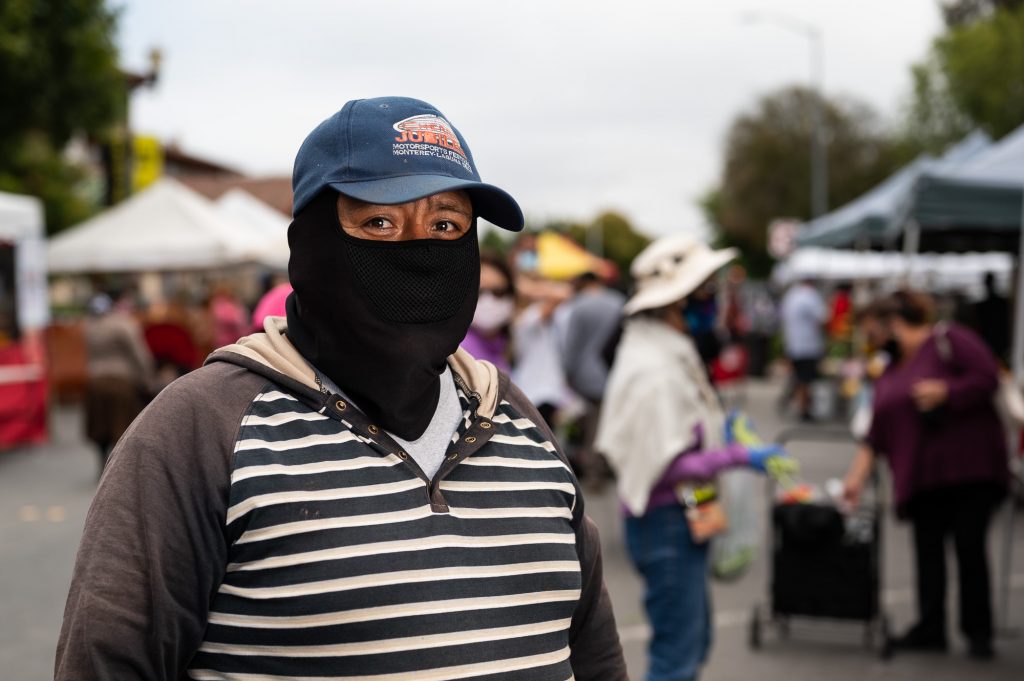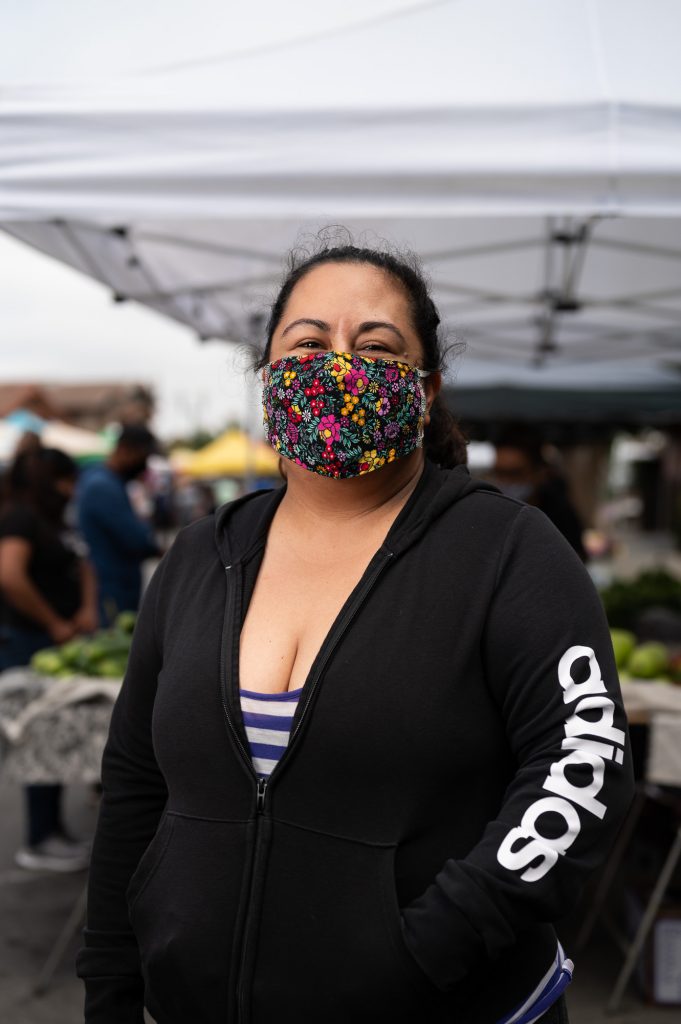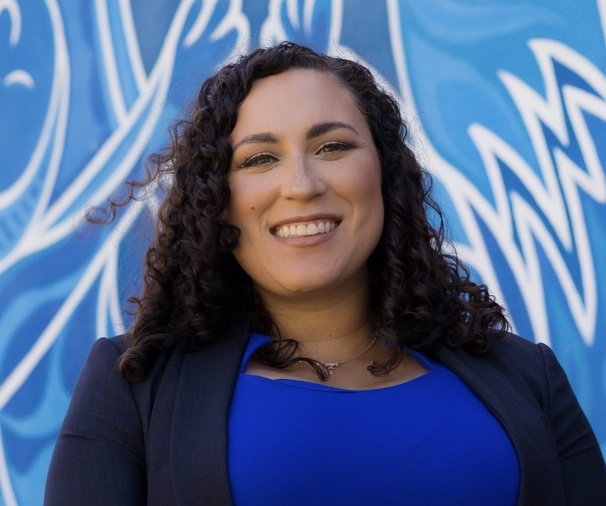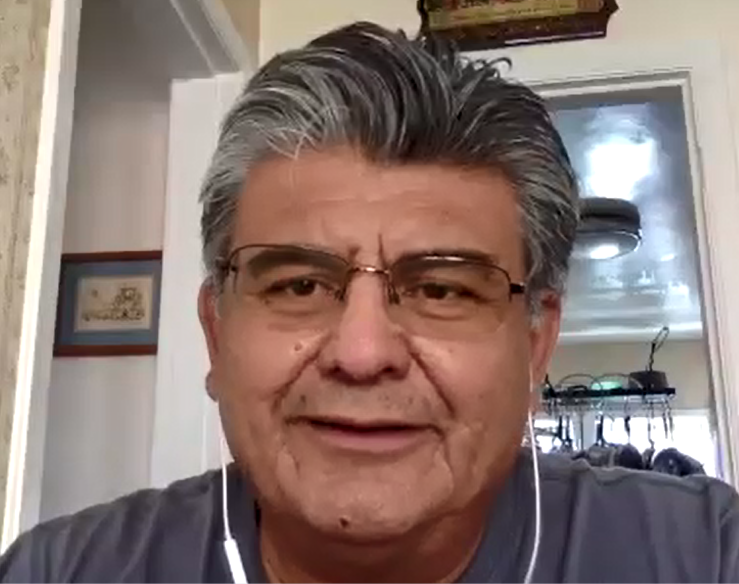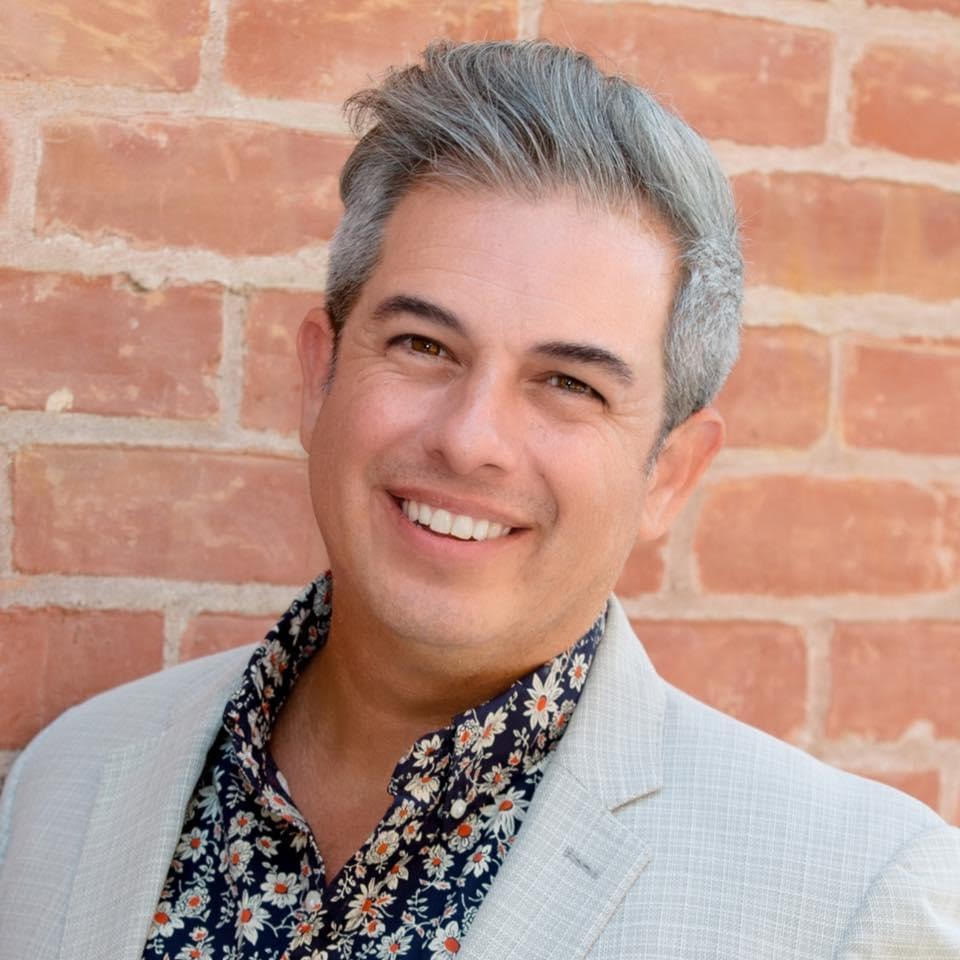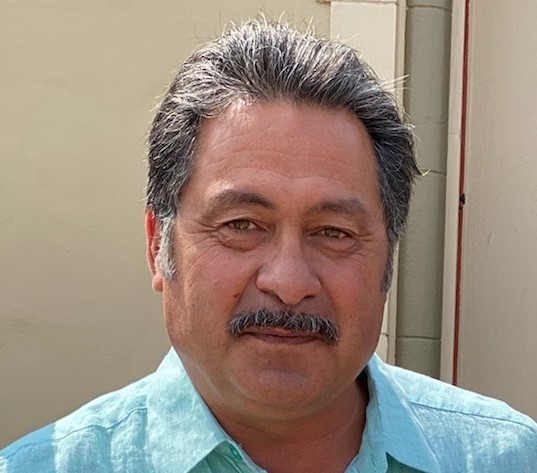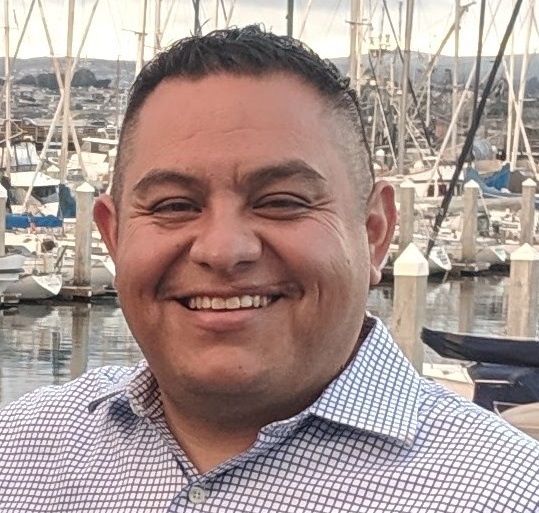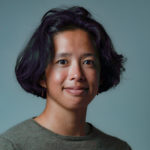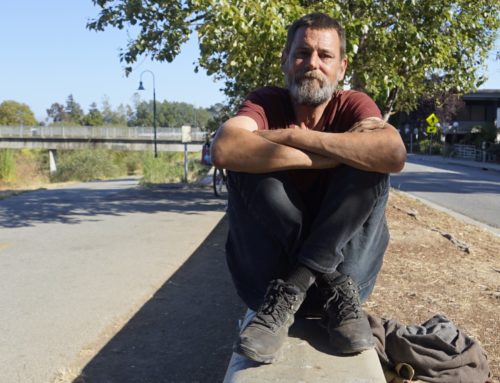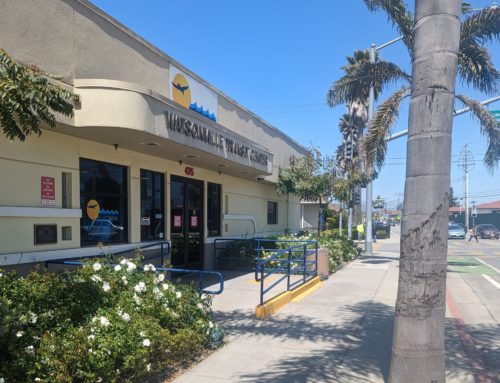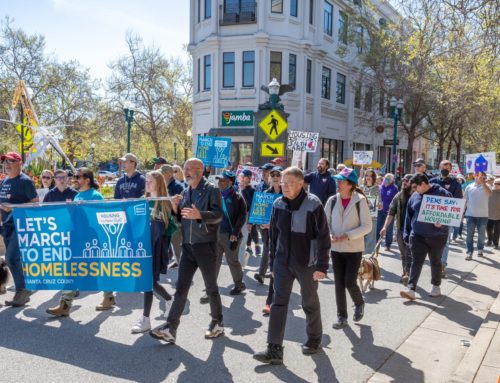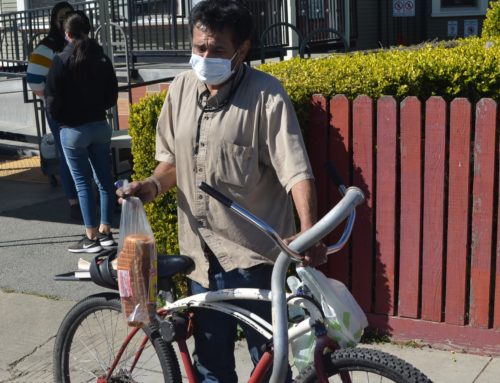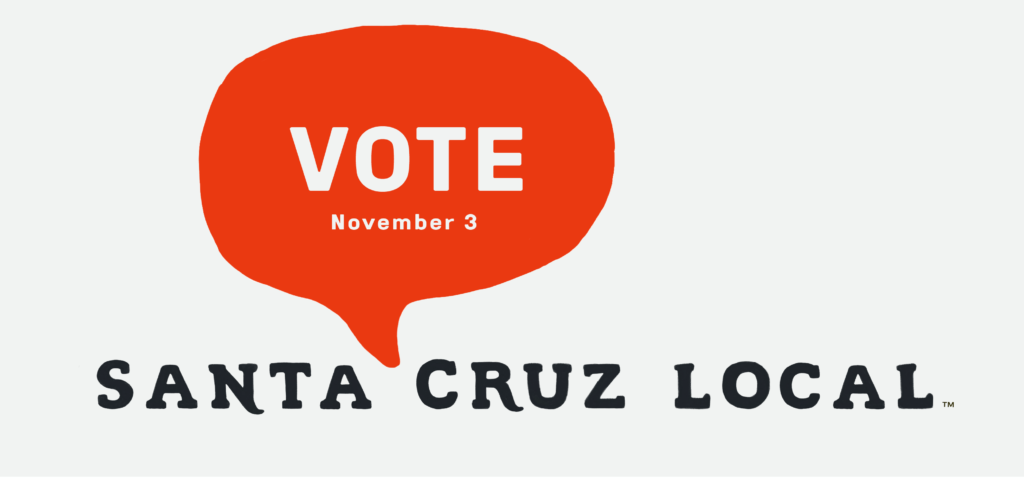
Santa Cruz Local presses the five Watsonville City Council candidates on the priorities we heard from residents: affordable housing development, city-sponsored youth programs, the high cost of rent and more. We break down the differences between District 2 candidates Aurelio Gonzalez and Vanessa Quiroz-Carter, District 6 candidates Jimmy Dutra and Tony Gomez, and District 1 candidate Eduardo Montesino.
Transcript below.
Some key takeaways
On housing:
- In the District 2 race, Aurelio Gonzalez and Vanessa Quiroz-Carter both said they’d like to rezone areas to allow more housing. Gonzalez said some industrial areas would be a good fit. Qurioz-Carter said she’d like to target some commercial areas. Neither listed any specific areas within District 2.
- In the District 6 race between Jimmy Dutra and Tony Gomez, Jimmy Dutra said he’d support denser housing near the highway or the railroad tracks. He did not list anywhere in District 6 that he’d support denser housing. Gomez said the city has limited space. He told me the only way it can grow is vertically.
On expanding the city’s youth programs:
- In the District 2 race. Aurelio Gonzalez said he’d commit funding to the parks and community services department. But he said balance is needed. He did not list any new funding sources beyond Measure Y. That was the half percent sales tax increase that he supported and voters approved. Vanessa Quiroz-Carter said she would support repealing Measure Y. Eight percent of Measure Y funding goes to parks and community services. The rest goes to the police and fire departments. Quiroz-Carter would want to change that, so more money goes to youth programs. Quiroz-Carter said she’d generally support moving funds from the police department to youth programs.
- In the District 6 race, Jimmy Dutra said he’d support restoring parks and community services funding to the pre-COVID levels. To expand those services any more, he said the city would have to lean on nonprofits. Tony Gomez said he wants to build a task force. It would study which youth programs are working, and where money is needed. He told me he wants to make sure money is well spent.
Photos by William Duncan — Santa Cruz Local
Listen to the rest of our Vote Nov. 3 elections series.
- Part 1: Start by listening (June 11, 2020)
- Part 2: Scotts Valley City Council (Sept. 30, 2020)
- Part 3: District 1 Santa Cruz County supervisor race (Oct. 4, 2020)
- Part 4: Watsonville City Council (Oct. 14, 2020)
Podcast transcripts usually are only available to Santa Cruz Local members. We offer our elections-related transcripts free as a public service. Santa Cruz Local depends on memberships from people like you to make sure vital information can be available to all. Can we count on your help?
Transcript
AD: This episode of Santa Cruz Local is sponsored by Court Appointed Special Advocates of Santa Cruz County. The program provides volunteers so that each child in foster care feels heard and connected. In these stressful times, volunteers are more important than ever. Learn more at casaofsantacruz.org.
AD: This episode is also sponsored by Equilibrium Float Spa in Santa Cruz. Equilibrium Float Spa provides flotation therapy and other treatments for a wide range of physical and mental ailments. Learn more at equilibriumfloat.com.
Kara Meyberg Guzman: I’m Kara Meyberg Guzman
This is Santa Cruz Local.
Today’s episode is about the Watsonville City Council race. This is part four of our Vote Nov. 3 elections podcast series. Today we’ll meet the five Watsonville city council candidates. Three of the seven seats are up for grabs.
A quick primer. Watsonville has seven city council districts. Watsonville residents vote for a candidate in their district. So who you see on your ballot depends on where you live.
District 2 includes part of downtown, roughly from Main Street east to Beck Street. If you live in District 2, you’ll see two names: incumbent Aurelio Gonzalez and challenger Vanessa Quiroz-Carter.
District 6 is roughly along Freedom Boulevard, between Green Valley Road and Marin Street. If you live in District 6, you’ll see two names. Tony Gomez and Jimmy Dutra. The seat is held now by Trina Coffman-Gomez. Coffman-Gomez is termed out. Coffman-Gomez happens to be married to one of the candidates, Tony Gomez. So if Tony Gomez were to win, he’d take his wife’s seat.
The last open seat is for District 1. That district includes part of downtown and the area between Main Street and West Beach Street. Voters there will see one name, Eduardo Montesino. He does not have an opponent. The seat is held now by Felipe Hernandez. Hernandez is termed out.
Please note that my descriptions of the districts are pretty rough. So please check out the district maps on our Elections Guide. Santa Cruz Local dot org slash Elections. We’ll also link to those maps in the show notes.
[MUSIC]
[Ambi of farmers market come up]
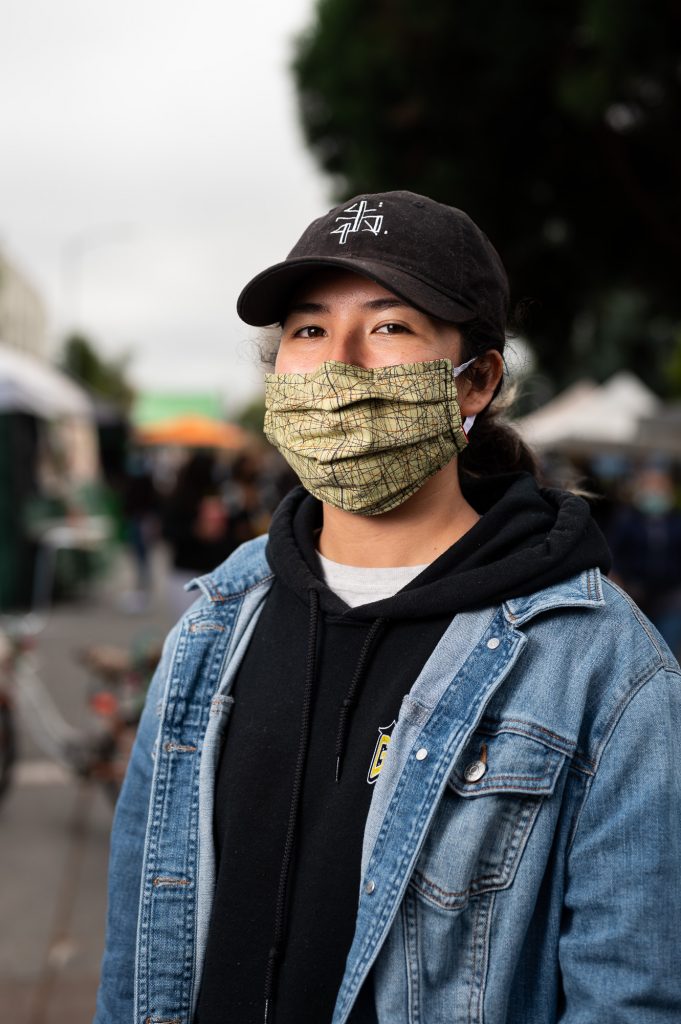
KMG: I met Yesenia Jimenez at the farmers market in July. She’s 26. She’s an educator. She will vote in the District 6 race.
Yesenia grew up in Watsonville. I asked her what she wanted the city council candidates to talk about as they compete for her vote.
YESENIA JIMENEZ: I’ve left and I came back, and it’s just ridiculous how expensive rent is getting. I don’t think they’re doing anything about it. They’re not that much about it. I think we should be building like vertically instead of outwards like, we have a limit and I don’t understand why they keep letting developers come in and build like townhouses instead of apartments.
I think it’s just like, I’m seeing certain people get pushed out like I know families that have ended up going to Los Baños and it’s just sad to see like our communities, it’s OK. Change is OK and change is good, but it would be nice if they accommodated for everyone and not just the people coming in because if we don’t watch that pretty soon like this is gonna turn into like a whole different town and it would be sad to lose that.
KMG: Affordable housing development and the high cost of rent were among the top priorities we heard across Watsonville.
Lidia Silva, I met in June. She was with her family at the farmers market.
Lidia is a nursing assistant. She has five children. She will vote in District 1.
I asked her what she wanted the city council candidates to talk about.
You’ll hear Oscar Rios. He’s our Spanish interpreter.
LIDIA SILVA (through Oscar Rios, Spanish interpreter): More activities for the youth. Because those are our future. I love Watsonville. It’s where I came, where my children have grown up. But one of the biggest needs that Watsonville needs is to enrich our youth in activities.
KMG: A demand for city-sponsored youth programs was another common theme we heard in Watsonville.
Here’s Paul DeWorken. He’s a small business owner. He sells clothing with “The Ville” strawberry logo.
He votes in District 1. He also serves on the city’s parks and recreation commission.
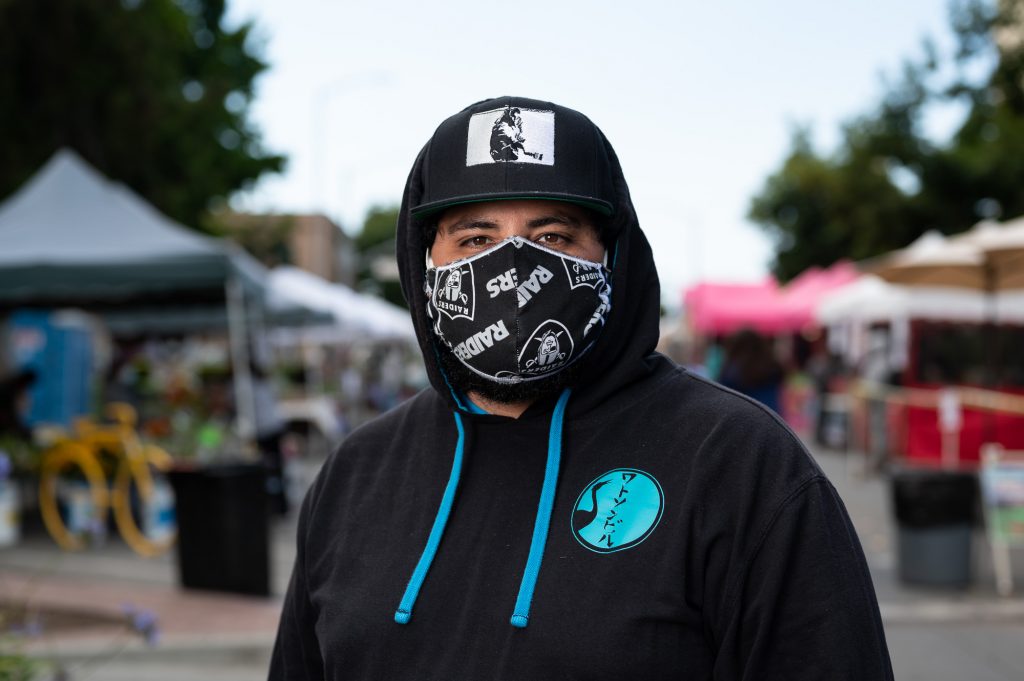
PAUL DEWORKEN: Growing up here my whole life, you know, I’m, I’m guilty of saying it. There’s nothing to do here in Watsonville. And the kids are, to this day, I’m, what, 39 years old now. And they’re saying the same thing. And I think I think that’s important because we need to focus on our youth, because they’re the future.
[MUSIC]
KMG: OK. Let’s meet the candidates. We’ll start with the District 6 race. The incumbent Aurelio Gonazlez and challenger Vanessa Quiroz-Carter. I asked them for their age, occupation and a fun thing they like to do in Watsonville.
AURELIO GONZALEZ: Hi, my name is Aurelio Gonzalez. I’m 58 years old. And what I like to do in Watsonville is actually I’ve been a coach for Little League for 25 years. And I like to go surf fishing. My beach, I call it my beach, Palm Beach. I’m retired. I retired as a construction laborer.
VANESSA QUIROZ-CARTER: My name is Vanessa Quiroz-Carter, and my age is 33. But it will be 34 tomorrow. But I’ll probably stay 33 because the COVID year doesn’t count. And my occupation, I am an adjunct professor at Hartnell College, and my favorite thing to do in Watsonville is probably to go for a run, I like to go up Freedom Boulevard or go to the levee.
KMG: Now for District 2. Jimmy Dutra and Tony Gomez.
JIMMY DUTRA: My name is Jimmy Dutra. And I want to say, first of all, thank you for having me today, glad we got to connect. I am a very young age of 45. And I like saying that because I’m getting closer to 50. So that’s really scary to me. But, um, so I, I am 45. I was born and raised here in Watsonville. And I’m third generation. And I attended local schools.
I am a teacher, I am currently doing distance learning. And I love to just hang out with friends. You know, have brunch and just kind of hang out at Ella’s at the Airport or go to, you know, Jalisco’s, and just kind of chill.
TONY GOMEZ: OK. My name is Tony Gomez, I’m 58 years old, and I’m retired. So I really don’t have an occupation. Usually I spend my time either devoting time to community service work, or I’m a car guy. So I have like seven cars, so I keep busy.
KMG: In District 1, the sole candidate is Eduardo Montesino.
EDUARDO MONTESINO: So my name is Eduardo Montesino. I’m running for watsonville City Council, in District 1. My age is 45. I’m soon to be 46. And I work for Santa Cruz Metro, I’m a transit supervisor, and things I like to do around the city. You know, and, you know, it’s difficult, but you know, hanging around with friends. But now with this pandemic, it’s been really difficult, and lonely.
KMG: Because Eduardo Montesino is uncontested, we’ll hear more from him at the end of this episode.
First question. Many residents said they want more options for housing. Many said they have friends and family who have moved away partly because of the lack of options. What’s your plan to create more housing options for all residents, including those with the lowest incomes?
Aurelio Gonzalez, for District 2.
AURELIO GONZALEZ: I know a lot of people see the city of watsonville to see all this land on the outskirts. But that’s all county land. And so they need to understand that concept that we’re really land restricted. We’re really land restricted. And so we need to be wise and how do we do our infill? Where do we redevelop? It’s going to be a tough question to answer.
Because there might be some, there is some properties that exists now that have old homes on them. They’re big lots. And I’ve explained to folks, sometimes it’s better to tear down that single family home and have a multi unit built there, where you have the single-family home, but you have five families living in it, you know? And where if you can build a multi-unit housing unit on that same lot that allows it by us rezoning it through the specific plan, then it’ll benefit our community. Because now instead of holding five families, we can house 10 families. And so those are benefits.
But NIMBYism — not in my backyard — has stopped that for many years in the city of Watsonville. And so we need to get over that. Our downtown is going to become more dense in population. But that’s because we’re land restricted. And we don’t want to build too much close to our sloughs. At the same time, we want to protect our wetlands.
There should be more development on Airport Boulevard. There’s gonna be more housing, there were townhomes built there. Hopefully those townhomes are going to be those that middle-edge part, you know, I’m saying? Where folks that aren’t middle, high income, but aren’t low income can qualify for that type of housing.
A good example is, we may have an industrial lot that sits. And because it’s industrial, it won’t allow residential. So we have to rezone that lot, and to do that we have to go through processes of CEQA [California Environmental Quality Act], EIRs [environmental impact reviews] and all that. And that’s what the specific plan is doing for this specific area in downtown.
KMG: Are there areas in your district that you see as prime for rezoning to accommodate denser housing?
AURELIO GONZALEZ: You know, in District 1 [Editor’s note: Gonzalez is running for District 2], we’re really limited. Even more. There is selected lots within the city limits.
You know, and the other thing you have to think about now we have ADUs [accessory dwelling units] that are being allowed. And so as a city, we need to look at where can new ADUs be brought into.
KMG: Vanessa Quiroz-Carter. What’s your plan to create more housing options for all residents, including those with the lowest incomes?
VANESSA QUIROZ-CARTER: I know firsthand that housing is a really big issue in our community, we have a lot of multi-generational and multi-family households. I myself live in one. I do live at home. I live with my family. And I know that it is a big issue here.
I do want to work with the council, if elected, and I want to work with developers. I want to work and see the zoning and see what we can do to help alleviate that. And my idea is to definitely have more affordable units. And maybe, you know, we can look at having more stipulations. As far as if there are new developments, that a portion of those developments need to be accessible, so they need to be affordable units.
I also, you know, I wish that we could have tiny housing villages and things like that, that they have in larger cities, just thinking outside the box.
But for now looking, really looking at the zoning, and looking at how we can bring in new developments that are accessible and are affordable to folks, I think that’s really the first priority.
Yeah, I would want to see more multi developer, or multi use buildings. So we’re you know, we have storefronts on the bottom and then up up top we have you know, dwellings, housing dwellings.
KMG: What are some areas that are possibly single family now that you think would be great for denser development?
VANESSA QUIROZ-CARTER: I think we have a lot of areas that are capable of having development. We have a lot of just empty lots. We have a lot of places that are just sitting empty. And if we could develop those, it would really help with the housing issue. And it would also help to allow us to have more local businesses here.
KMG: But any specifically that come to mind?
VANESSA QUIROZ-CARTER: Not anything I can think of off the top of my head. I know there are areas like out near airport and places like that, that could see definitely new development, places out by the slough. You know, we have a lot of new housing out that way.
I’d like to see more housing in my own area and my own district, but we’re pretty limited as we are one of the more historic districts. So we are, you know, mostly single-family homes. And so maybe more in the residential. And that’s why I talked about looking at zoning. Because, you know, seeing what we could do, excuse me — the commercial districts — to see what we can do with the zoning to kind of figure out OK, can we put multi-use buildings here.
KMG: And then you are talking about inclusionary rates. So the city already requires a certain percentage of units to be offered at affordable rates to people with lower income. Would you be in favor of increasing or changing that requirement?
VANESSA QUIROZ-CARTER: I think it’s definitely worth looking into and seeing if we need revisions, because we’re in COVID, right. We’re in some unprecedented circumstances right now. And I think that our demographics, in terms of finances, and you know, what people are making is going to look a lot different. I know, folks are struggling financially right now.
So I think it’s definitely worth looking at and seeing if there is a revision needed and putting, putting that, you know, to out to the community and seeing what the community feels is appropriate.
KMG: Now for the District 6 race. Jimmy Dutra, same question. What’s your plan to create more housing options for all residents, including those with the lowest incomes?
JIMMY DUTRA: One of the first things that I support is multi use. So where there’s going to be businesses on the bottom and then maybe three or four stories above it can be housing. We’re definitely pushing towards doing this on Main Street in the downtown area. We’ve already seen, you know, one building go up in this manner. We see another one probably starting at the end of this year, if not spring of next year. And we see other people, owners have already kind of expressed interest in doing this type of development.
This is going to be really important to the future of Watsonville and to the residents, because it will be able to create housing, and then also keep downtown walkable, livable. And once that happens, then hopefully build the economy by businesses moving into it.
I also do support with new construction, a 25% affordability portion that we have. So that means that in any new construction, 25% of the units that are being sold have to be sold at an affordable rate. So I do support that as well. And I do support, you know, I want to make sure that we do have developments coming to town, so they have to pencil out. But I also do understand the importance of housing, and the need for here in our community.
KMG: To clarify, the city’s law currently requires developers of rental projects [of a certain size] to make 20% of units affordable. Developers of for-sale projects have to make 15% or 20% of units affordable. It depends on the project’s size.
Jimmy Dutra told me he’s in favor of that current affordability requirement.
I asked Dutra, is there anywhere in your district that you would support denser housing?
JIMMY DUTRA: So in my district, it’s a little bit interesting. I mean, there was a spot on Atkinson Lane, where people wanted to do a huge project between the county and the city. But I’m not really supportive, because at the same time, the infrastructure has to be able to support it.
And a lot of our roads are really old, frail, small. Parking’s a big issue already. So if we’re going to be making it dense, it has to, has to make sense, and there has to be enough parking. And a lot of these, you know, on Main Street, they’re building parking like underground, or they’re doing level tiered parking. So those projects are going to work.
When you just try to go build on land, you know, and you’re just ,and you’re not going to be improving the infrastructure, that makes it hard. And in like in my area, I mean, they’re, they’re building a new project right now on Atkinson Lane and Freedom Boulevard, which will be high density, which I think is going to, you know, kind of be, I think it’s gonna cause an issue for a lot of the residents who live around there. So I think that once that that’s built, we’re going to see, you know, how we move forward.
KMG: Is there anywhere else that you would support mixed use denser housing?
JIMMY DUTRA: I like I like areas near the highway or near the railroad tracks. So especially if they ever build a rail, that, you know, to have housing around it will be important.
So I don’t know if we’ll ever see that my lifetime or your lifetime, but people do talk about it. So, but there are areas on the outskirts of town that I think that would be quite useful and appropriate for building, you know, multi-use kind of housing.
KMG: Tony Gomez, same question. What’s your plan to create more housing options for all residents, including those with the lowest income?
TONY GOMEZ: Our problem we have with housing in Watsonville is, we’re 58% rentals. So with the scheduled developments coming down the road, they’re all affordable housing, but they’re all rents. Watsonville hasn’t actually built any houses for sale since 2006. So that drives the market up because of supply and demand.
KMG: Quick fact check. Gomez is accurate that renters fill 58% of the city’s housing units. That’s according to census data.
However, hundreds of for-sale units have been built in the city since 2006. Many of them are town homes.
Right now, five for-sale housing projects are in the pipeline. Together, they total 312 units. It’s a mix of affordable and market rate.
One multi-family rental project is under review. It has 77 units, a mix of market rate and affordable units.
Two housing projects in the pipeline are 100% affordable. They total 125 units.
OK. Back to my interview with Tony Gomez.
KMG: So you’re saying that the city is actually producing too many rentals. And what you’d like to see is multi family homes for sale so you actually like to see denser housing.
TONY GOMEZ: You can’t tell the developer what they want to do. They bring the projects forward. So it’s not you can’t really say the city’s imposing this. But the problem is, is with less space, you’re going to be stuck with, well, you’re going to have to build, either either be multi use where it’s retail, on the bottom housing on the top. You’re going to be looking at, with the limited space, and looking at three-story, four-story units, because you don’t have the footprint to put anything bigger on it. So you have to go vertical.
And that’s going to, some people may be opposed to that, because then you start losing that small-town atmosphere, because you start looking like the urban suburbs with three- and four-story or, you know, buildings. So it’s a catch. Because you only have so much space to work with. And you can’t, your footprint can’t go out, it’s got to have to go up.
But the thing is, is you have to realize that you’re only, I’m only one piece in a collaborative group of seven. So you have to have a collaborative agreement to move any project forward. So it’s not, you know, I can have all the best interest in the world and saying, ‘This is what I’d like to see happen.’ But if the other six disagree, you go nowhere. So, yeah, it’s got to be mutual.
KMG: I understand. But what is it that you would like to see in terms of housing, like, what, what plans would you push?
TONY GOMEZ: Well, if I don’t have all the housing data, to be honest with you, and I’m not going to rush to a decision and say, this is what I favor, when I don’t have all the information. So I’m not the type of person that just throws something out there. I can give you the — I’ve given you the information that I’ve collected and monitored on my own. So without actually being in that position, and actually having the raw data in front of me to see actually, what’s the best interest, you really can’t answer the question, because I don’t have all the information.
KMG: Back to the District 2 race. Next question. Most Watsonville residents we interviewed said they want more city-sponsored youth activities. What can you do as a city councilmember to restore and expand the city’s budget for youth programs?
Aurelio Gonzalez.
AURELIO GONAZLEZ: I think the city as a whole really wants to invest more in our youth. I’m for investing more in our youth. And how do we get, generate that funding for it? You know, we just passed Measure Y. They should be getting 8% more.
KMG: Measure Y was a half percent sales tax increase. Voters approved it in March. Most of the money raised goes to the city’s police and fire departments. Eight percent goes to the city’s parks and community services department.
Gonzalez was one of four council members who approved Measure Y.
AURELIO GONAZLEZ: And then we just got to continue to cooperation. like for the school district, I’ve been an advocate in the background, for opening up the schools, to our community. I’m not at the meetings, I’m not in the forefront of that. But I am behind the scenes of it. And I’ve really been pushing hard on an opening up our schools. We have an MOU [memorandum of understanding] with the school district, and we’re going to be opening up. E.A. Hall [Middle School] will be our trial project.
The ideal thing would be when school, after-school programs end, or right before they end, that the city could go in with their rec department and keep the gates open for the public to use. Then the city would be responsible to close the gate to make sure that everybody vacates the facility. So there’s no vandalism done to this to the project to the property.
KMG: What can you commit to as an elected leader to expand the offerings for city-sponsored youth programs? Once it’s allowed, you know?
AURELIO GONAZLEZ: Of course it’s funding our parks and our recs, our community services department. That’s where the balance has to come in. Because we can’t take away from you know, we can’t take money from somewhere else to to feed something else. And then we’re going to be short at the other end. And so we either have to learn how to use the money that we have budgetary wise, and then ensure that parks and recs gets funded properly.
KMG: Vanessa Quiroz-Carter. What can you do as a city councilmember to restore and expand the city’s budget for youth programs?
VANESSA QUIROZ-CARTER: I’ve talked a lot about the budget, and looking at places where we can kind of move more money into the budget. I’ve talked a lot about Measure Y, right, and the possibility of repealing that. And seeing if some of those funds can be put into other things like youth program development, like youth services. So really looking at that and seeing what we’re able to do.
And again, it’s really difficult in times of COVID, right, in times where we do have we are having to meet our immediate needs. But we do need to make sure that we are providing services, and we are providing opportunities for our youth. Because that’s how they grow. That’s how they become really engaged, as I said before.
And so that’s the way to do that is looking at well, where you know, where do we have excess funds? How can we shift those funds into these programs? And how do we make them run? And how do we make them accessible, because when you know there are classes available and things like that, but we need to have scholarships. We need to have you know those things available to all people who are interested in all of our youth who want to participate and want to be able to do that.
KMG: What are some examples of programs you’d be willing to cut or departments, in favor of youth activities?
VANESSA QUIROZ-CARTER: I think definitely looking at the policing budget, that is a really big piece of the budget in Watsonville. And I know that Watsonville is a full service city and so we do have a lot of payments that we need to make in terms of making that run.
But I think you know, if things are working well, if you know, crime is very low. It’s been low for the past four years. But we have, you know, pedestrians getting hit by cars. We have car accidents. We have kids not having access to after school programs and things like that, that’s a really big concern for me.
And so really looking at those kind of needs, and shifting that some of that money away from that kind of overinflated budget, I think is super important, to go back into the community and to create opportunities to you know, really, really champion public safety, and the future of our city, because the future really is in our youth. So I’m really, really invested in youth programs, really invested in public works. And so that’s where I would sort of try to look at the money and see, you know, what, we can move around to make that happen.
KMG: Back to the District 6 race, Jimmy Dutra and Tony Gomez. What will you do to restore and expand funding for city youth programs?
Jimmy Dutra.
JIMMY DUTRA: Right. And so, I mean, I think we need some clarity on this, because I mean, they, from what I understand the current city council cut that budget because we’re in COVID, and you can’t be interacting with each other.
KMG: Yes.
JIMMY DUTRA: So yeah, the money was there. And so it was used in other places in the budget. So but as we start coming out of COVID, and are being able to interact with each other, hopefully, 2021, we can start doing this. I definitely want to make sure that that money gets back in there. I don’t — I mean, I’ve had conversations with the city about this already. And I don’t think they have any intention of keeping the money away from the programs, I think that they planned on putting the money back.
So I think that’s important, I think we need to make sure that the programming money that’s coming from Measure Y is getting there as well. And that we make sure that, you know, we can try to work with our nonprofit organizations that their programs are also working. I think it’s gonna be important for most of us on the city council, the funding for programs.
So I would be very, very surprised — and I would not, I would not support it — if there was some way there was a vote to say we’re, you know, let’s keep the funding out for programs. No. So once COVID is over, my view and position is that money needs to go back to the programs.
KMG: Do you see any opportunities to even expand the funding for city youth programs?
JIMMY DUTRA: I think that we really need to at this point, because of the pandemic, just make sure that the programs that we have come back. And if we’re going to talk about expansion, maybe that’s you know, we start working collaboration with other organizations to, to bring that, to bring new programs.
Because when you start working as a team, like I tell my students in class, you get more done with a team than you do alone. You know, when you start working as a team, your your resources are larger, and they’re greater and you have more staff, you have more money, there’s a lot more things to do. So I would really encourage in order to maybe, you know, create new programs, in addition is to start working with our partners and create more through that way. Because I think money’s gonna be tight.
KMG: Tony Gomez. What will you do to restore and expand funding for city youth programs?
TONY GOMEZ: Well, I mean, with everything that you do, I mean, the first thing would be is roll your program back out to where it was, where it’s at now. And then most cases, the best way to take input and take that data and look at what’s wanted or needed, is putting a task force together. Getting them to meet, to sit down, figure out what the concerns are, figure out what direction you need to go. And also figure out what you can afford as far as a budget.
Because as you know, with the COVID impact, it affects the city as a whole financially. So I mean, you have to look at those things first before you just start just throwing money out at programs that may or may not work, and then you end up rolling them back up because it didn’t work.
KMG: Back to the District 2 race, between Aurelio Gonzalez and Vanessa Quiroz-Carter.
People said reducing high rents was a priority even before COVID. What’s your plan to address the rent burden after the COVID emergency ends, especially if state and federal tenant protections end?
Aurelio Gonzalez.
AURELIO GONZALEZ: Right now, currently, we have the resolution we passed to help anybody that’s in COVID, that has difficulties paying their rent, that we’ll try to assist them. And so we’ve allocated some funding to that, and in hopes that, you know, we may help 70 or 80 families in the process.
But for me, it’s saying that if we can do this on a more permanent basis, whether CDBG funding, then we need to look at funding that CDBG funding comes, maybe take a portion of that and allocate it to the housing part. You know what I mean? So when somebody comes to us and saying, my child got sick, I can’t work. I can’t pay my rent. But I need to take my child to Stanford. We can help them, you know, we should be able to apply to the city, instead of and there’s nonprofits and we help we need to support our nonprofits. That’s the other term. You know, I mean, our social services.
How do we support our social services because the city is not designed to be a social service provider. OK. And so we need to learn how do we support our social services? And how do we, how do we get money to fund them? And it might be, you know, everybody hates this word, but it might be a new tax. You know, it might be something like Measure Y, that we may have to create, you know, another quarter cent tax that will help us support our parks and recs and our social services. And that special tax would just then be for those two departments and to support them. Because I mean, it takes funding. And that’s how a city works. And right now, we’re kind of short on our funding part.
KMG: Gonzalez clarified that he wanted to find a more permanent way to use federal Community Development Block Grant, or CDBG funding, for rental assistance.
Vanessa Quiroz-Carter on addressing the rent burden.
VANESSA QUIROZ-CARTER: I’m really, I am in favor of rent boards. And I know that can be scary to some folks, right? Especially folks who are invested, who are landlords, who own properties and things like that.
But the way that I’m looking at it is that this is something that’s going to benefit the community because we can have, you know, our renters stay renting. We can have our landlords keep getting paid. But we need the input, right. We need to have sort of this committee that’s made up of folks to make sure that things are going right. To make sure that the processes are being followed that rules and regulations are being followed, and to protect both renters and the landlords.
So that’s really, really essential. And to make sure that there aren’t — one of the concerns that I have is that, you know, rent spikes will happen after COVID, right? We don’t really know what’s going to happen. But I want to make sure that that’s not going to happen, right. And I think we need people from all different backgrounds to come together on this type of rent board to really look at the logistics of it to put in the perspective of a landlord, to put in the perspective of a renter, of a developer, and then just having that, you know, all the voices represented, to make sure that everything’s as equitable for folks as possible, and that we’re not, you know, like I said, having these extreme rent hikes or people are not being evicted, especially once those protections end. And so I know that’s, that’s really scary for a lot of people, and I would not want to see that happen.
KMG: So just to clarify, so I’ve I’ve seen rent boards, mostly in the context of cities that have some sort of rent control. Is that what you’re interested in?
VANESSA QUIROZ-CARTER: Yeah, I mean, I think I and rent control in theory is really great. And I think that we would need to hammer out the details of what that would look like, and work in conjunction with that rent board to make sure that’s followed.
KMG: OK, back to the District 6 race between Jimmy Dutra and Tony Gomez. What’s your plan to address the rent burden after the COVID emergency ends? Jimmy Dutra.
JIMMY DUTRA: We definitely need to do something to help keep people in their homes, and whether that’s creating some sort of programs to help which, you know, there already are a lot of programs. I know, there’s a Section 8 program. I know that there are other, there’s a lot of assistance out there. So I think, you know, making sure people get to the right place, so that they can, you know, maybe get help, or guidance in, in order for them to stay in their housing.
But there also, I believe, needs to be protection for the owners of the property. Because a lot of the people that that own property, this is their only income, especially if they’re they’re older and senior, they’ve, they’ve saved their whole life to have a rental property so that they can live off of, and to see, you know, to not be able to get that, that, you know, the funding for their own personal lives, puts them at jeopardy, too, and also puts the house there, the rental house, the property, their American dream, puts that at risk of being lost as well, especially it’s not paid off.
So we’ve got to figure out solutions. And I think that’s going to start at the top. I think that needs to come from state government. I mean, I think the federal government needs to step in. But I think we see more of an issue here in California because people want to live here.
KMG: Tony Gomez.
TONY GOMEZ: They’ve received grant money for assistance for you know, the COVID thing and they’ve received assistance through some of the nonprofits for the rent that people have those $100,000 the first round, the second hundred thousand just came out recently for the second round.
And the way it looks, it looks like if the federal government does what everybody hopes they do, they’ll probably offer some programs to assist people. Because if you displace people, you have more people homeless, and we all know the homeless situation is a tough situation to be in.
And I would have to say that most of the cities are tapped out. I mean, they’ve done all they can do financially. It’s going to be one of those things where the federal government is going to need to step in and provide that assistance, the safety net to people to get them back into the workforce. And the main thing is if they don’t have housing, then it’s very tough for them to get back into the workforce.
KMG: Next question. Back to the District 2 race. Aurelio Gonazalez and Vanessa Quiroz-Carter. What plans will you push to support small local businesses and downtown businesses in 2021?
Aurelio Gonzalez.
AURELIO GONZALEZ: I think what we really need because we have a lot of Latino commercial businesses, is that somehow we need to develop a program for our Latino community, commercial businesses, to get the information that’s required. They may have to require to create their own chamber, which they had many, many years ago. It existed in the city of Watsonville, or come and join the chamber. And so with that, we need to develop a good sound educational campaign.
And that’s the big difference between the city of Santa Cruz and the city of Capitola and us. They’re a big hospitality town and they’ve taken a bigger hit than we have. Unfortunately for us, we’re the laymen, we’re the workers for that industry, we have a big portion of workers, that live within city of watsonville. So they’ve taken a big hit. And so those are the ones we need to learn how to support and how to how do we get them re-adjusted. But for those reasons, they’ve lost a lot more brick-and-mortar businesses permanently, then the city of Watsonville has.
KMG: Do you believe that there’s a need for more local subsidies for small businesses? And if so, would you commit to pushing for that in your next term?
AURELIO GONZALEZ: You know, first, I think it’s kind of, you know, the penny can only go so far. You know, and so either we’re going to invest in our youth and programs, because, you know, even though we might be doing a little bit better fiscally, but this is going to take us two or three years to actually completely come out of it. Or maybe even more. It depends on how the economy plays out.
So I’d love to be able to say, ‘Oh, yeah, we you know, we’re gonna have money to be able to give subsidies to, to commercial folks.’ But again, it’s one of those risks things that they do when you go into business, is how do you, how do you make a business successful. And some folks were able to transition. And some folks weren’t able to transition into the, to the new model.
And so it, you know, again, it’s educational, how do we educate our Latino commerce people to be successful? And think out of the box and not just stay within, you know, the folks that are gonna walk into my businesses, what’s going to make my business?
KMG: Vanessa Quiroz-Carter. What plans will you push to support small local businesses and downtown businesses in 2021?
VANESSA QUIROZ-CARTER: Watsonville has this small-town feel. We are a city, but we have that really nice hometown, small-town feel. And I would love to keep that. I want to see more small businesses, I want to support more small businesses. I don’t want to just see corporation after corporation after corporation coming in. Because we really want to invest in ourselves.
So having small businesses I think, is the key to do that. And I would like to work with partners who are willing to help make that happen. So whether that’s, you know, local credit unions who have programs to give out loans for people, or nonprofits like El Pajaro CDC [Community Development Corporation], who have classes, right. They teach people on how to fill out these applications and how you know, what it takes to run a business and business plans and things like that. So again, working with a group, to come together to be able to provide those services to be able to help people’s dreams come true, I think is really my plan.
And again zoning, seeing what what’s new, what we can, what we can really do with the space that we have, and we do have a lot of downtown storefronts that are empty. And so really, I think it’s really taking a village to help fill that up right to make people’s dreams come true. To have our local businesses back.
KMG: Now to the District 6 candidates, Jimmy Dutra and Tony Gomez. What plans will you push to support small local businesses and downtown businesses in 2021?
Jimmy Dutra.
JIMMY DUTRA: The plans that I’m going to be pushing for is, you know, I know that we had some rental assistance that went to people who lived in houses. But I think we really need to do that for our small businesses as well. Because, you know, so many people, so many families put all of their lives, livelihoods into these businesses and they’re losing everything. They’re shutting down their doors, and they’re just losing everything that they put, saved every dollar. So if there’s if we’re able to help people, you know to stay in their homes, it’s also important that we also help people stay in their businesses as well, especially small businesses.
KMG: Any ideas on how where to get the funding for rental assistance for commercial businesses?
JIMMY DUTRA: That’s gonna be crazy. I mean, that’s going to be something we’re going to work with the state and pushing our legislators to create some sort of funding for them. If not the federal government, but you know how that they’re working these days, so we can’t really count on them at all. So I would be pushing in our state legislature to try to pass some sort of funding for these small businesses.
And in a position that you’re, in leadership position, that I would be in as a city council member, we have direct access to our representatives, so we should be able to be having these conversations with them.
KMG: Tony Gomez. What plans will you push to support small local businesses and downtown businesses in 2021?
TONY GOMEZ: That’s a tough one. Because that whole downtown corridor, we’ve been hearing that, that pitch for decades. And it’s been a struggle. And it’s been tough. I’ve heard, you know, on the backside, well, they want one lane going both ways. It’s a thoroughfare, it’s an exchange for Caltrans, it’s a main thoroughfare for travel. And, putting it one lane each way isn’t really going to change anything. Because, yeah, are you also going to go slower. But you have to give people a reason to stop.
And that’s, that’s the whole thing, is the business model. They do have their business model. And there are things in the works right now where the PV [Pajaro Valley] Arts gallery would be ideal thing to, to move or move them into the Porter building on Main Street. And being that they’re the arts, and stuff, they have a lot of people who come from out of town into Watsonville who normally wouldn’t come to Watsonville. And it meets the business plan of the city for revitalization for Main Street. They want to draw people to Main Street. Well, you put an art gallery there, in the studios there and they do the open walk studios every year or quarterly. I’m not sure exactly the demographics of timeframe, but it brings people downtown. That would be their first step of rolling it the other way.
The other thing would be utilizing the plaza, using that as an anchor towards your arts thing with your music. I know that they’re slated to add restrooms to the plaza area, which would make it more usable, as far as people coming downtown and accessing it.
And that those would be just a small wing of getting a footprint. And then expanding from there with the small business. With the COVID thing, we still don’t know where we’re at. So it’s kind of tough for somebody to roll out a new business when you don’t know what your business future is going to be until we find out what our new normal is.
KMG: Next question for the District 2 candidates, Aurelio Gonzalez and Vanessa Quiroz-Carter. We heard from residents that race and policing was a priority. If elected, how will you ensure that communities of color are treated justly and fairly by the police department?
Aurelio Gonzalez.
AURELIO GONZALEZ: You know, right now, we’re working with an ad hoc committee that we’re establishing. It has actually been established. We’re going to be meeting. Those are the first steps. We need to look at how we can create reform and make reform happen. It’s going to take these individuals that are going to be in this committee to do that.
I’ll be one of them on that committee, but I’m hoping that the committee itself, the membership that’s going to be on it really is the driving force behind this. And we are there to really listen to it and help implement what may come out of it. And so those are the first steps.
I think our police department overall, has fairly done a good job. Obviously, there’s always going to be incidences that can be better handled. And I think that’s where we need to work at, is how can we give the tools to our police force, to better handle different situations?
You know, the ultimate goal is is ad hoc committee, because it’s an ad hoc committee, and it will come to its end within a year, is to see how do we create an advisory committee, a permanent advisory committee. And how is it structured? And who’s going to be on it? And what are the guidelines for that advisory committee? Everything has to be built upon something. And these are the first steps towards that.
KMG: Vanessa Quiroz-Carter. How will you ensure that communities of color are treated justly and fairly by the police department?
VANESSA QUIROZ-CARTER: I have been working with a group of concerned citizens, right. And we want to really see that happen. And so we’ve been in contact with Mayor [Rebecca] Garcia on her idea, along with Chief [David] Honda and a couple other people on the city council who are putting together this ad hoc committee on, I believe, racial justice and social equity and things like that.
So really just, you know, being in conversation about what that looks like, and what that’s entailing and how they recruited people and how they were getting that information out to people and trying, you know, pushing, advocating for it to be equitable, truly equitable, right?
And so just asking for more transparency, and accountability on the way that, you know, that was formed. And going forward? Right, I would really like to continue to be in conversation with that committee and see what they are, you know, what they’re about, and really, truly making sure that the voices of people are heard and their concerns are taken seriously. Because I think we’ve heard a lot, especially on the national level, right, we’ve heard a lot about social inequities or racial inequities with regards to the police department. And that’s very, very concerning to me.
KMG: Now for the District 6 candidates, Jimmy Dutra and Tony Gomez. If elected, how will you ensure that communities of color are treated justly and fairly by the police department?
Jimmy Dutra.
JIMMY DUTRA: You know, I mean, we have a really high Latino population. So we have a lot of people of color in our community. And I really do see a good relationship with the majority of the police officers and the citizens of our community here in watsonville.
This is the No. 1 question that I get when I knock on doors from both Democrats and from Republicans. You know, what is your position on the police department? And, you know, people just don’t want to see it defunded. And I think that using the word defunded kind of scared a lot of people. You know, I always say, listen, there’s always an opportunity for improvement, and oversight. And within an organization, oversight is important.
So I know that Watsonville’s moving forward with an oversight committee, a committee made up of residents, for the police department, and I think that’s a good start. And, but I’m not for defunding the police. I think we live in a very safe community because of them. But like I said, we can always improve, and oversight is really important.
KMG: Same question. Tony Gomez.
TONY GOMEZ: Well as you know, right now they’re in the process of developing their task force to analyze and look what the police department’s doing right and what is deficient. I call it deficient, because I don’t believe in ‘wrong,’ because it can be corrected.
So until we get that data and know what’s going on, we really don’t know what issues we’re addressing. As it stands right now we have a low crime rate. We’re sitting really good, compared to other cities. So it kind of gives you an insight that our police department’s doing something right.
You know, and we’re not, we’re not getting that national news that you see where there’s abuse, there’s things that are happening that shouldn’t be happening. And, you know, it’s not just, you know, I look at it this is way: Black Lives Matter, and all lives matter. You know, and so across the board, but until we can get that task force to meet and figure out what our deficiencies are, what we need to improve on.You just got to hold tight and get all the information and data in front of you.
KMG: Next question, for the District 2 candidates, Aurelio Gonzalez and Vanessa Quiroz-Carter. Many Watsonville residents said they want more help for recent immigrants. That includes rent assistance and unemployment benefits. What will you do to make those resources more accessible to recent immigrants, regardless of their legal status?
Aurelio Gonzalez.
AURELIO GONZALEZ: As a city, we try to assist as much as possible. But again, the city is not a social service agency. They’re not built to handle that. And that’s where we need to learn how to use our nonprofits.
And we have some great nonprofits within our community. And so how do we give, make sure that the information that’s being disseminated out there, gets to those folks, and they know where the resources are at? And I think as a city, we’ve been doing a really good job in putting out that information. But sometimes, it always happens that unfortunate, I don’t know, or how do I get on that website? You know, and then I don’t have a computer.
But then if you look at it, our library has computers. We give access, computers to our community, you know. It’s not like our community doesn’t have access to computers. If they really wanted to get a computer, they can go to the library. They can get help. They’ll teach them how to get online and get look for that information.
And so I think, as a city, we’ve always kind of worked towards that direction, to help all our community members, our immigrants, and our just arriving immigrants. But again, it’s a question of who’s the best agency that really assists them in that process.
KMG: Vanessa Quiroz-Carter.
VANESSA QUIROZ-CARTER: You know, there are a lot of nonprofits and services and organizations that are doing that work. But the issue, again, is connection. And the issue is, how do we really connect with these populations? Because I think we tend to think like, oh, you know, everybody has access to the internet, or everybody has a smartphone, everybody has, you know, these things that aren’t really accessible to everyone.
So figuring out, how do we reach these folks? How do we make sure that these folks are getting the information, that they’re feeling connected, that they’re not isolated? And that takes a lot of working together. In terms of being able to have, you know, connections and lists and resources on ‘Well, we don’t do this, but we can refer you out to someone who does,’ right.
And so it, it really takes a web, it really takes that interconnectedness. And just working, knowing, I would want to work with different groups in different orgs and really talking about, hey, how do we do this? Let’s strategize. Let’s brainstorm. Right? And it’s really about the most vulnerable folks, who may not speak Spanish, right? We tend to think like, ‘Oh, we need Spanish language,’ but there’s folks that don’t speak Spanish that speak Mixteco, and we need to figure out, OK, how can we get this information out to those folks as well? Right, how do we get information out to folks who may not be literate, right? We need to have a translator. We need to have interpreters. We need to really do the groundwork.
KMG: District 6 candidates, same question. Many Watsonville residents said they want more help for recent immigrants that includes rent assistance and unemployment benefits. What will you do to make those resources more accessible to recent immigrants, regardless of their legal status?
Jimmy Dutra.
JIMMY DUTRA: One of them is a state issue. So unemployment, that’s something that we don’t, we can’t control at the city level. That’s, that’s what that’s going to be the state unemployment. And so I believe the governor gave a one-time voucher of, I think, $500, to even undocumented workers. So I think that there has to be more work at the state level, if that’s going to happen. With the other part of it was —
KMG: Rent Assistance?
JIMMY DUTRA: Yeah. So I think that, you know, putting, you know, our, you know, our day laborers into contact with programs that assist with that, I think that’s gonna be important. I mean, there’s organizations like CAB [Community Action Board], and other organizations who really help with, you know, these kind of situations. You know, and like I said earlier, I think there, there’s also like Section 8, there’s other programs out there that really do help offer funding for people and, and their housing situation.
KMG: Quick note. Section 8, also known as Housing Choice, is rental assistance for people with low incomes. Families pay about a third of their income to their landlord. The county’s housing authority pays the rest, up to a limit.
The housing authority does check immigration status. They will prorate assistance, depending on how many people in the household have legal immigration status.
Also, Dutra is right that California gave $500 each to 150,000 residents who live here illegally. They were left out of the federal COVID stimulus money.
OK. Same question, Tony Gomez.
TONY GOMEZ: Well, the unemployment we really don’t have any real bearing on as a city, because that’s state funded and state run. So you can, you really don’t have any input on it. You fall into the discretion of what this state decides. I believe that if an immigrant is here, and then they get a temporary Social Security number, like they can, and they pay their taxes, and they do their part, they should be entitled to it. I mean, if you pay into the system, you should be entitled to, to use that, that benefit towards you, irregardless of what you what your status is, your race, your color, your creed. It should be open to anybody who pays into the system.
And as far as the rent control, they’ve already they’re already doing that now with the COVID thing right now. They’re they’re not asking anybody if they’re what their citizenship is or anything, they just take their financial outcome, they look at it and say, OK, yes, we can assist you. And they figure out I believe the maximum was $1,500 for the rent under the COVID thing. And that’s where the city now is facilitating the same thing. They’re not asking any of the, what their legal status is. They’re just making sure they keep them housed.
They’re pretty much limited unless they get more grant money. Because if you keep continually drawing off your general fund, it becomes depleted, then you fall into this Stockton deal where you have a city claiming bankruptcy, the state coming in and taking over and then you really have no say what goes on.
KMG: Quick note here. Earlier this year, city leaders worked with the nonprofit Community Action Board to administer a rental assistance program in May and June. It ran out of funding. The city council recently approved a second round of similar funding.
For that first round, the nonprofit did check for applicants’ legal immigration status. At least one person in the household had to have legal status to get rental assistance.
[MUSIC]
KMG: Now let’s hear from Eduardo Montesino. He’s the candidate for District 1. He does not have an opponent.
Technically someone from District 1 could still file as a write-in candidate. The deadline to file is Oct. 20. But most likely, Montesino will be the District 1 city council member.
Montesino served on the council from 2010 to 2014, for District 4.
We’ll ask Montesino [about] the top issues we heard from Watsonville residents: housing and youth programs.
Here’s Montesino on his plan to create more housing options for all residents, including those with the lowest incomes.
EDUARDO MONTESINO: We got to look at a lot of options. I mean, the last term that I was on, we’re talking about measures and talking to the county to open up the city. Because we’re very landlocked, within the city limits. So that’s a conversation we need to have with the county so we can attain, or being able to use some farmland, which is very controversial.
Because we’re so landlocked that the only place to grow is the airport, you know. And the airport, you know, you have the distractors [detractors].
So everything is gonna be a challenge, but I think more people coming out and saying we, we, we want more housing and more housing opportunities because their relatives are moving. I think that’s the pressure that needs to be put on all of us.
You know, we keep growing just whether the downtown up that’s, that’s another, you know, another option, but it all, everything’s controversial, you know, so, we need more residents to come out and say, what they really need, what they want.
We need to come out of this pandemic with a vision of where we’re heading, and what going to be the fight where we’re gonna grow where we can keep our residents locally.
Because the pressure is south south south, you know, Santa Cruz people like I, I grew up in Santa Cruz. I was, you know, couldn’t afford to live here, I’m pushed out, and more people from Watsonville are being pushed out to Salinas, some people are being pushed out to Los Baños. So like I said, I’m hoping to hear from a lot of residents to, to get support on on, on their vision of what they want to do.
KMG: In Santa Cruz Local’s Watsonville City Council candidate forum earlier this month, I asked all the candidates the same question. Would you want to rezone or annex county farmland next to the city to allow development? It has been a controversial topic. Montesino did not support that idea.
Another candidate did support rezoning or annexing county farmland: Aurelio Gonzalez.
Back to Eduardo Montesino. What can you do to restore and expand the city’s budget for youth programs?
EDUARDO MONTESINO: Every dime that we spend, we need to look at, is it working well. Is these opportunities for our youth? Like we, we, you know, we have the indoor soccer, but it’s not run by the city, it’s run by a, you know, a business. Why aren’t we running it? It’s our property.
I mean, we lease it, why can’t we run it ourselves and provide more opportunity and enhance it?
One of my statements, political statements is gonna be on my platform is going to be, you know, putting together funds for Ramsay Park to be turf, you know, you know, artificial turf, because that provides an avenue for, you know, to use it all year round.
KMG: It’s true, a private business, Soccer Central Indoor Sports, runs the indoor soccer leagues at Ramsay Park.
I asked Montesino where the money would come from for artificial turf on the outdoor soccer field. He told me the city could recruit volunteers. They could run some of the city’s youth soccer programs.
I asked Montesino if there were programs or departments that he’d be willing to shift funds away from in favor of youth programs.
EDUARDO MONTESINO: I’m pretty sure I can find some. [Laughs.]
Like I said, a lot of people are stuck and doing the same thing. I think, the last time that I was there [on city council], four years, a lot of people look at it, it’s like don’t rock the boat. When this time, it’s like, the boat is already rocking.
So let’s look at our options. And let’s look at what’s beneficial for our community. And where we can leverage more money out of things is it, you know, buying a fire truck is more needed, then, you know, keeping it for another two years. Is it, you know, instead, you know an office that needs to be refurbished, or can it wait a little bit longer and spend it on somewhere else.
So those are the little nitty gritty details that you have to look at, to leverage some of those much needed funds that we’re going to need for our community.
KMG: I asked Montesino about his plan to address high rents, after the COVID emergency ends.
EDUARDO MONTESINO: We got to entice more developers because the thing is, there’s no inventory. That’s why the prices have gone up from rentals to housing. Because there’s no inventory, we gotta, we gotta help our developers develop faster and attract more developers but I think getting the planning process to be, you know, a faster process. So they So, because I know, they want to build faster, so they can be more on the inventory. But I think Yeah, attracting more inventory is, is the key, because we don’t have it.
We can only force so many people that, you know, to say, don’t evict anybody. But, you know, they also got to run a business. So it’s looking at that balance. But like I said, our community needs to grow.
And, you know, it’s like I said, it’s going to be controversial, but we need some land from the county, or, or within ourselves, we need to look at options of where the spur is going to go. Is it just up in the downtown? Is it just up in some communities? We have some pretty good sites, I think on Freedom Boulevard. So looking at those options, and attracting, you know, developers.
[MUSIC]
KMG: Let’s recap some differences between the candidates.
On affordable housing development.
In the District 2 race, Aurelio Gonzalez and Vanessa Quiroz-Carter both said they’d like to rezone areas to allow more housing. Aurelio Gonzalez said some industrial areas would be a good fit. Vanessa Qurioz-Carter said she’d like to target some commercial areas.
Neither listed any specific areas within District 2.
In the District 6 race between Jimmy Dutra and Tony Gomez, Jimmy Dutra said he’d support denser housing near the highway or railroad tracks. He did not list anywhere in District 6 that he’d support denser housing.
Tony Gomez said the city has limited space. He told me the only way it can grow is vertically.
On expanding the city’s youth programs.
In the District 2 race. Aurelio Gonzalez said he’d commit funding to the parks and community services department. But he said balance is needed. He did not list any new funding sources beyond Measure Y. That was the half percent sales tax increase that he supported and voters approved.
Vanessa Quiroz-Carter said she would support repealing Measure Y. Eight percent of Measure Y funding goes to parks and community services. The rest goes to the police and fire departments. Quiroz-Carter would want to change that, so more money goes to youth programs. Quiroz-Carter said she’d generally support moving funds from the police department to youth programs.
In the District 6 race, Jimmy Dutra said he’d support restoring parks and community services funding to the pre-COVID levels. To expand those services any more, the city would have to lean on nonprofits, he told me.
Tony Gomez said he’d want to build a task force. It would study which youth programs are working, and where money is needed. He told me he wants to make sure money is well spent.
[MUSIC]
KMG: To dig deeper Watsonville City Council race, visit Santa Cruz Local DOT O-R-G SLASH Elections.
You’ll find answers to a written questionnaire for the candidates, an issue grid explaining their differences.
And you can watch a video of our Watsonville City Council candidate forum earlier this month.
We have info on each of the city council races in our county, and the District 1 county supervisor race. We press all the candidates on the priorities we heard in our more than 400 interviews and surveys with residents.
[OUTRO MUSIC]
Santa Cruz Local’s journalism free for everyone. But our work costs money to produce. For example, this episode included reporting from more than 50 interviews with Watsonville residents.
Our work is supported by Santa Cruz Local members. Our members make recurring monthly or annual contributions, starting at $9 a month or $99 a year. Thank you to our more than 640 Santa Cruz Local members. You make our work possible.
Thank you especially to our guardian level members: Debra Szeicei. Chris Neklason. Patrick Reilly. Elizabeth and David Doolin. And the Kelley Family.
Thanks to Trimpot for the music. I’m Kara Meyberg Guzman.
Thanks for listening to Santa Cruz Local.
AD: This episode of Santa Cruz Local was sponsored by UC Santa Cruz. UC Santa Cruz tells its story every other week in its StoryCruz podcast. Listen to conversations about UC Santa Cruz news, research, breakthroughs, people and events. Find StoryCruz on Stitcher, iTunes, and Google Play.
Santa Cruz Local depends on memberships from people like you to make sure vital information can be available to all. Can we count on your help?
Kara Meyberg Guzman is the CEO and co-founder of Santa Cruz Local. Prior to Santa Cruz Local, she served as the Santa Cruz Sentinel’s managing editor. She has a biology degree from Stanford University and lives in Santa Cruz.

